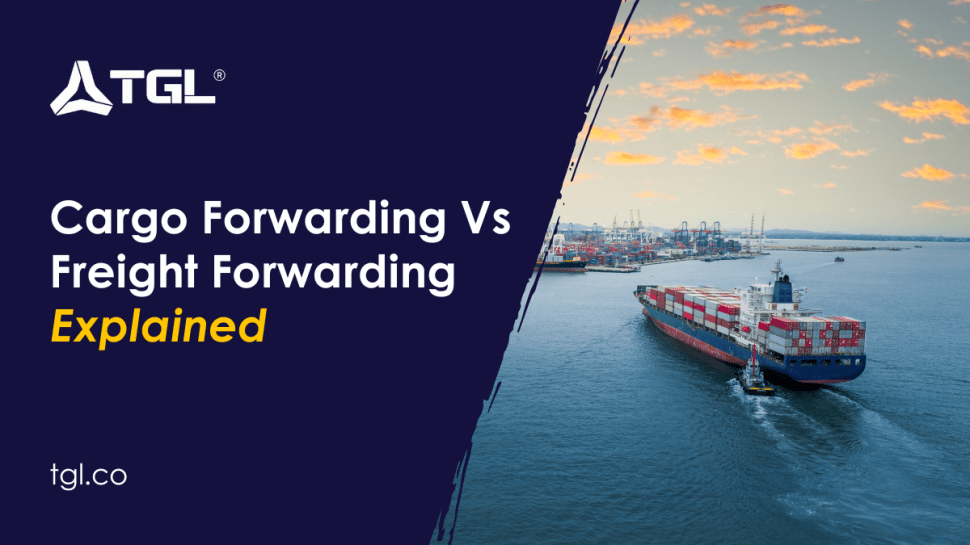In the logistics world, some terms are used so interchangeably that even industry professionals pause to double-check. One of the most common pairings that cause confusion is Cargo Forwarding and Freight Forwarding. While they might seem like two sides of the same coin, they actually carry different meanings, and knowing that distinction can impact how you ship, who you work with, and what services you’re really getting.
At Think Global Logistics (TGL), our mission is to simplify logistics and help businesses make smart, informed decisions. So let’s break it down: what’s the real difference between cargo forwarding and freight forwarding?
What Is Freight Forwarding?
Freight forwarding is a professional service that manages the end-to-end transportation of goods. Whether you’re shipping locally within Australia or across international borders, a freight forwarder acts as your logistics partner. They handle every element of the shipment process—from negotiating freight rates and booking cargo space to managing documentation, customs clearance, warehousing, and tracking.
At TGL, freight forwarding is not just about moving boxes. It’s about creating smooth, tailored supply chain solutions for our clients. We coordinate with trusted carriers, manage time-critical schedules, ensure compliance with local and international laws, and keep you in the loop every step of the way.
Freight forwarding covers:
- Route and transport planning
- Carrier and shipping bookings (air, sea, road, rail)
- Documentation and customs clearance
- Warehousing and consolidation
- Freight insurance and compliance
- Real-time shipment tracking
What Is Cargo Forwarding?
Cargo forwarding, on the other hand, is a more general or informal term. It typically refers to the movement of goods or cargo from one location to another. The phrase is often used in casual conversation or by those outside the logistics industry, and it doesn’t necessarily imply any specific services or responsibilities.
While “cargo” is the term used for the actual goods being shipped, “cargo forwarding” just refers to the act of sending those goods on their way. It doesn’t include the strategic, operational, or legal support that freight forwarding provides.
Think of it this way:
- Cargo = The goods
- Forwarding = The movement or handling
- Cargo Forwarding = The movement of goods, broadly speaking
- Freight Forwarding = The professional service managing the movement of goods
Why the Confusion?
The confusion between these terms likely stems from how language evolves in different regions and industries. In Australia, freight forwarding is the widely recognised term for the comprehensive logistics service that includes everything from packing to customs documentation and final delivery. Cargo forwarding is less commonly used among professionals, and when it is, it’s typically a loose or umbrella term.
At TGL, we always aim to educate our clients and provide full transparency. If someone mentions cargo forwarding, we make sure they understand that what they need is a trusted freight forwarding partner to handle the entire journey.
Why It Matters for Your Business
For Australian businesses involved in import/export, manufacturing, e-commerce, or wholesale, working with the right logistics provider is essential. Understanding the difference between freight forwarding and cargo forwarding means knowing what level of service you’re receiving.
Here’s why choosing a freight forwarder like TGL matters:
- Efficiency: We plan the most cost-effective and time-saving routes for your shipments.
- Compliance: We handle tricky customs and quarantine requirements, which are especially strict in Australia.
- Visibility: We provide tracking, reporting, and updates so you always know where your goods are.
- Risk Reduction: We offer insurance and handle documentation to prevent costly delays or legal issues.
- Custom Solutions: We tailor logistics to fit your business model, whether you’re sending wine to Asia or receiving automotive parts from Europe.
A simple cargo movement won’t cover all that. Freight forwarding is the full package—and it’s what TGL delivers.
TGL’s Approach: Personal, Professional, Proven
At Think Global Logistics, we pride ourselves on taking a hands-on, client-first approach. We know that every business is different, and so is every shipment. That’s why we don’t offer cookie-cutter solutions, we craft logistics plans based on your unique requirements, industry demands, and destination regulations.
From SMEs to large enterprises, we’ve helped countless Australian businesses navigate the complex world of freight with ease. Our team is based right here in Australia, with global connections and decades of experience behind us. Whether it’s sea freight, air freight, or domestic transportation, TGL brings the local know-how and global reach you can rely on.
Conclusion
So, are freight forwarding and cargo forwarding the same? Not quite. While they’re related, freight forwarding is the full professional service that ensures your goods move legally, safely, and efficiently. Cargo forwarding is more of a casual or descriptive term for goods being moved.
If you’re running a business and need to ship products across borders, or even across states, you want a freight forwarding partner who does more than just move cargo. You want someone who understands the challenges, solves the problems, and gets your goods where they need to be without the headache.
That’s what we do at TGL.
Ready to Move Smarter?
Get in touch with the team at Think Global Logistics today and find out how we can make your supply chain faster, simpler, and more cost-effective. We don’t just forward freight—we move businesses forward.
